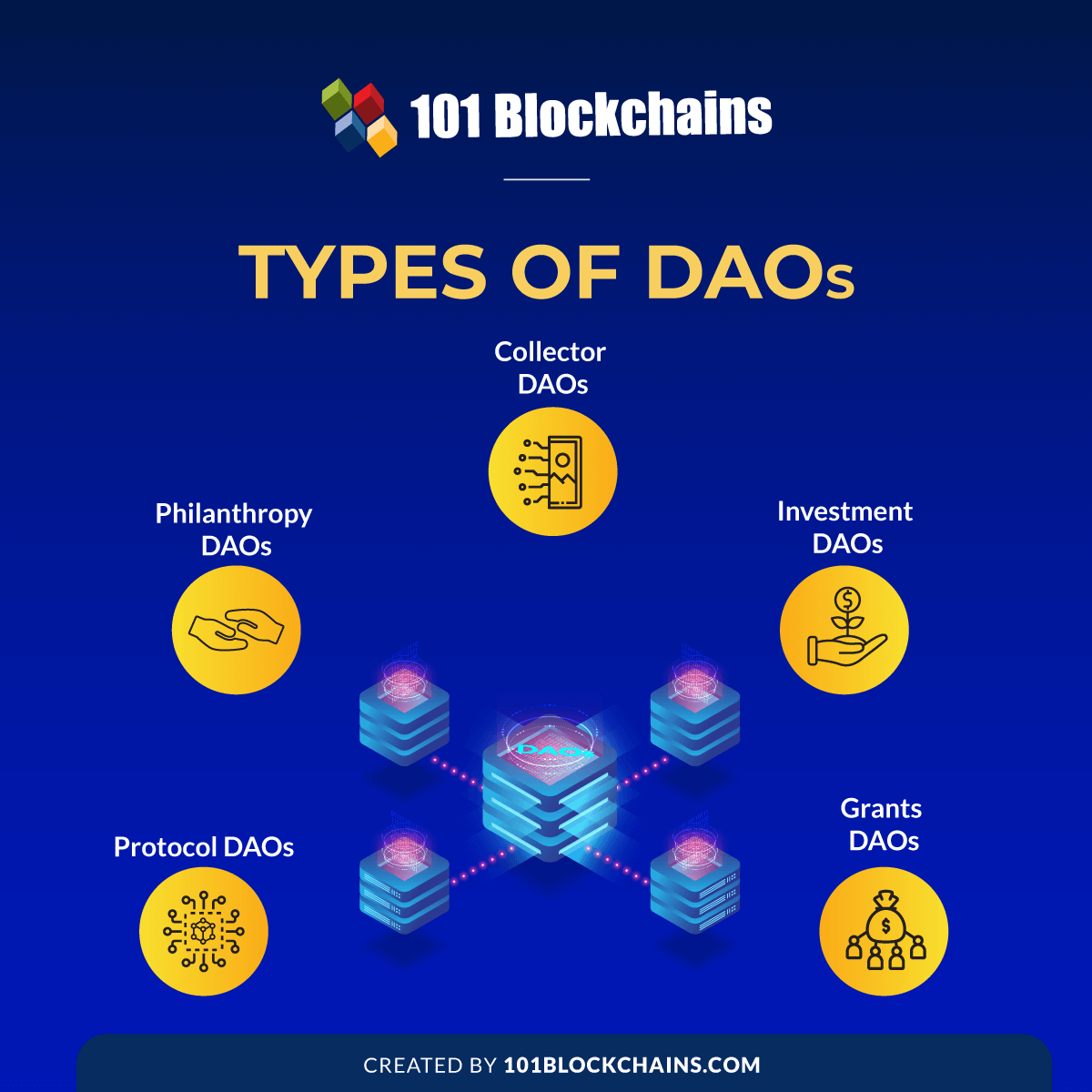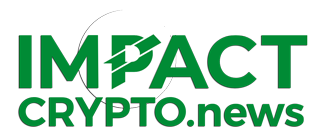[ad_1]
Decentralized autonomous organizations don’t have any affiliation to nation-states and run on blockchain networks with a decentralized autonomous structure. Every member has control over the decision-making processes of the DAO, and you can explore a wide range of use cases for DAO. The attention around different DAO types has been soaring higher due to the expansion of the web3 landscape. Let us learn more about different types of DAOs in detail, with popular examples for each category in the following discussion.
Want to learn blockchain technology in detail? Enroll Now in Certified Enterprise Blockchain Professional (CEBP) Course
Fundamentals of DAOs
If you want to find answers to “What types of DAOs are there?” then you must learn about DAO basics. First of all, let us find out what a DAO is. In simple words, you can think of decentralized autonomous organizations as the modern variants of online communities. For example, a group of people sharing one bank account can qualify as a DAO if every member has a vote in decisions about depositing and withdrawing funds. In this example, the group of people doesn’t rely on the bank for decisions on raising and distributing funds.
DAOs have become quite popular in recent times for the facility of growing and building communities and businesses with decentralization. The world’s largest decentralized exchange, Uniswap, utilizes DAO, while one DAO was specifically designed for raising funds to support the Ukrainian army.
One of the common highlights in all types of decentralized autonomous organization would refer to the collective set of rules. All the members of the decentralized autonomous organizations work in collaboration with a shared set of rules. However, you would find that all DAOs are not equal, as they are created with specific goals.
Types of DAOs
The arrival of decentralized finance products introduced the immediate necessity of decentralized governance through DAOs and governance tokens. Subsequently, DAOs proved an efficient choice with the support of innovative advancements in blockchain technology. The different types of DAO could leverage smart contracts and on-chain governance through voting for empowering organization members.
However, the growing scale of the web3 ecosystem and evolution in blockchain technology offers substantial support for creating DAOs. On the other hand, it is important to identify the type of DAO you would need based on your objective. Here is an outline of some of the most important types of DAOs with popular examples in each category.
Want to learn and understand the scope and purpose of DeFi? Enroll Now in Introduction to Defi- Decentralized Finance Course

1. Protocol DAOs
Protocol DAOs are one of the most common DAO types you can find today. As the name implies, these DAOs focus on governance of decentralized protocols. For example, Automated Market Maker or AMM DAOs utilize smart contract protocols for offering DeFi services such as borrowing/lending applications or decentralized exchanges. Protocol DAOs can also serve as a vital asset for governance of other types of decentralized applications.
Here are the notable examples of protocol DAOs –
MakerDAO is one of the original DAOs, which garnered huge popularity in the DeFi market. As a matter of fact, it is one of the earliest DeFi projects on the Ethereum blockchain. The platform utilizes smart contracts to help users borrow and lend cryptocurrencies at customized lending rates and estimates of repayable amounts. As one of the top examples of one of the most important types of DAOs, MakerDAO follows the token governance model. The platform utilizes MKR governance tokens for holders to express their vote on different modifications in the Maker Protocol.
Excited to learn the basic and advanced concepts of ethereum technology? Enroll Now in The Complete Ethereum Technology Course
Another notable example of protocol DAOs draws Uniswap into the equation. Uniswap fulfills the requirements for protocol-based types of decentralized autonomous organization with its governance token, UNI. The community has the necessary voting rights for decision-making on the development and operations of Uniswap. UNI token holders take control over the Uniswap governance, protocol fee changes, and UNI community treasury funds alongside other aspects.
You can also find the answers to “What types of DAOs are there?” in Yearn Finance. The Yearn DAO is a popular example of DAOs based on governance tokens. YFI token holders can contribute funds to the DAO, which in turn delegates to DAO Vaults.
2. Philanthropy DAOs
Philanthropy DAOs are also one of the less common types of DAO right now. They focus on supporting social responsibility initiatives focused on a shared goal of delivering an impact on the web3 landscape.
You might be wondering about the feasibility of philanthropy DAOs. However, examples of such DAO types prove the power of DAOs. The first-ever non-profit DAO for philanthropy purposes, Big Green DAO, has set a unique precedent for the future of social responsibility in web3. Big Green DAO is associated with Big Green; a charity organization focused on increasing awareness about growing food for improving nutrition security and understanding the climate impact of food.
Want to know the evolution of the web3.0 , its architecture and examples? Read the detailed guide Now on Web3.0 App Examples
3. Collector DAOs
The next important entry among the most important types of DAOs would refer to collector DAOs. As a matter of fact, one of the prime objectives of collector DAOs focuses on collecting funds so that the community can have ownership of blue-chip NFT and other digital collectibles.
You can also think of collector DAOs as NFT DAOs. Considering the growing dominance of NFTs in the emerging web3 landscape, collector DAOs would definitely gain a solid foundation. As a matter of fact, some of the popular examples of collector DAOs have exploded in popularity alongside NFTs.
Flamingo DAO is one of the notable examples of collector DAOs. The members of the platform collected high-value NFTs from digital artists such as XCopy, Pak, and Hackatao. As the popularity of such types of DAO increases in the future, investors can find exposure to expensive NFTs without taking risks with their valuable investments.
Want to get an in-depth understanding of non-fungible tokens (NFTs)? Become a member and get free access to NFT Fundamentals Course
4. Investment DAOs
Decentralized Autonomous Organizations offer the prospects for a broad range of use cases. One of the most prominent applications of DAOs refers to raising investments for the whole organization. The answers to “What types of DAOs are there?” would obviously draw attention towards investment DAOs, which work basically as traditional investment funds. You have the same model of working on a pool of funds as in the traditional investment funds, albeit without any centralized controlling entity. On the contrary, DAO token holders can only vote on the decisions regarding projects for investing funds.
Also referred to as venture DAOs, investment DAOs generally pool the funds for investments in early-stage blockchain projects and crypto projects. Investment DAOs offer an exclusive avenue for investments in new web3 protocols and off-chain investments. At the same time, such types of decentralized autonomous organization also help in accessing portfolios, which were inaccessible in traditional finance.
The most notable example of investment DAOs would obviously refer to MetaCartel Ventures. It is basically a sub-DAO, included within the larger MetaCartel DAO. As a matter of fact, MetaCartel Ventures is one of the initial DAOs focused on investing in new dApps for profits. It provides low barriers to entry for early-stage investments.
Start learning Blockchain with World’s first Blockchain Career Paths with quality resources tailored by industry experts Now!
5. Grants DAOs
Along the lines of investment DAOs, you can also discover another notable entry among DAO types in grants DAOs. Such examples of DAOs are tailored for funding and fostering new projects and ventures, particularly in the DeFi space. Grants DAOs are also generally developed as a philanthropic extension of larger projects in DeFi space or as completely different entities in the DeFi ecosystem.
The first example among grants DAOs refers to Aave Grants DAO. It is a community-driven program for pooling funds that can drive new ideas and projects for fuelling the development of the Aave Protocol.
Another popular example of grants DAO would point at Uniswap Grants, which is basically one of the most important types of DAOs with its decentralized exchange. The DAO system focuses on managing the funding of new projects related to DeFi and Uniswap itself. Uniswap Grants is a popular example of grants DAO which offers to fund protocol development tasks and initiatives such as DeFi hackathons.
Apart from the popular entries among types of DAOs, you can also find the following variants among DAOs.
- Social DAOs
- Media DAOs
- Entertainment DAOs
Learn the fundamentals of Decentralized Finance (DeFi) with DeFi flashcards!
Final Words
The final overview regarding the different types of DAO basically rounds upon the power of decentralized autonomous organizations. DAOs are one of the significant highlights of the new developments witnessed in web3. With the power of autonomy and decentralization, DAOs can offer a conclusive tool for achieving truly decentralized governance.
Interestingly, the diverse functionalities in different types of DAOs offer testament to the potential of these new tools in the blockchain and crypto space. The varying use cases of DAOs, starting from raising investments for purchasing NFTs to social causes, will continue to expand in the future. Start learning more about DAOs in detail and prepare for the web3 trends right now.
Join our annual/monthly membership program and get unlimited access to 25+ professional courses and 55+ on-demand webinars.
*Disclaimer: The article should not be taken as, and is not intended to provide any investment advice. Claims made in this article do not constitute investment advice and should not be taken as such. 101 Blockchains shall not be responsible for any loss sustained by any person who relies on this article. Do your own research!
[ad_2]
Source link


